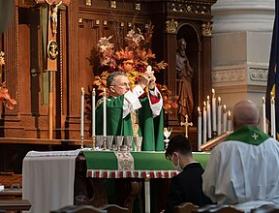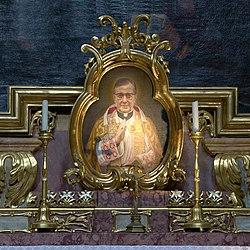In honor of the Fortnight for Freedom, I am going to limit today’s quick picks on Christian persecution to the United States.
The list below comes from the website of the United States Conference of Catholic Bishops. None of these examples involves burning down churches or mass murders of Christians. They do, however, show a huge change in the way that religious liberty is viewed by the government from just a few years ago.
I believe that this change has come about primarily through the almost non-stop Christian bashing that takes place in our media, academia and on websites. Christian bashing has become so popular that those who practice it as a profession, such as certain authors, speakers and bloggers, are not only able to continue their practice of Christian bashing without facing objections, they make an excellent living at it.
The rise of professional Christian bashers and the aggressive way that they ply their trade has certainly contributed to a cultural situation in which Christians must constantly be on the defensive. I think it has also fueled the attitudes which have led to the discriminatory practices listed below.
I’ve said a number of times that discrimination is a continuum. People do not move to violent persecution in one step. They work themselves into it by moving along a progression of prejudice and hatred. I believe that America is, as a nation, moving rather rapidly along that progression where Christians are concerned.
From the USCCB:
Current Threats To Religious Liberty
An Overview of Specific Examples
Pope Benedict XVI spoke last year about his worry that religious liberty in the United States is being weakened. He called religious liberty the “most cherished of American freedoms.” However, unfortunately, our most cherished freedom is under threat. Consider the following:
- HHS mandate for contraception, sterilization, and abortion-inducing drugs. The mandate of the Department of Health and Human Services forces religious institutions to facilitate and fund a product contrary to their own moral teaching. Further, the federal government tries to define which religious institutions are “religious enough” to merit protection of their religious liberty.
- Catholic foster care and adoption services. Boston, San Francisco, the District of Columbia, and the State of Illinois have driven local Catholic Charities out of the business of providing adoption or foster care services—by revoking their licenses, by ending their government contracts, or both—because those Charities refused to place children with same-sex couples or unmarried opposite-sex couples who cohabit.
- State immigration laws. Several states have recently passed laws that forbid what they deem as “harboring” of undocumented immigrants—and what the Church deems Christian charity and pastoral care to these immigrants.
- Discrimination against small church congregations. New York City adopted a policy that barred the Bronx Household of Faith and other churches from renting public schools on weekends for worship services, even though non-religious groups could rent the same schools for many other uses. Litigation in this case continues.
- Discrimination against Catholic humanitarian services. After years of excellent performance by the U.S. Conference of Catholic Bishops’ Migration and Refugee Services (MRS) in administering contract services for victims of human trafficking, the federal government changed its contract specifications to require MRS to provide or refer for contraceptive and abortion services in violation of Catholic teaching.
- Christian students on campus. In its over-100-year history, the University of California Hastings College of Law has denied student organization status to only one group, the Christian Legal Society, because it required its leaders to be Christian and to abstain from sexual activity outside of marriage.
- Forcing religious groups to host same-sex “marriage” or civil union ceremonies. A New Jersey judge recently found that a Methodist ministry violated state law when the ministry declined to allow two women to hold a “civil union” ceremony on its private property. Further, a civil rights complaint has been filed against the Catholic Church in Hawaii by a person requesting to use a chapel to hold a same-sex “marriage” ceremony.
Is our most cherished freedom truly under threat? Yes, Pope Benedict XVI recognized just last year that various attempts to limit the freedom of religion in the U.S. are particularly concerning. The threat to religious freedom is larger than any single case or issue and has its roots in secularism in our culture. The Holy Father has asked for the laity to have courage to counter secularism that would “delegitimize the Church’s participation in public debate about the issues which are determining the future of American society.”










